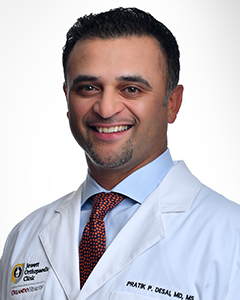10 Questions To Ask Before Joint Replacement Surgery
When joints stop working properly and start causing severe pain, your doctor might recommend a prosthetic replacement so you will have better mobility and comfort.
Joint replacement surgery is a major procedure, and it’s important to ask the right questions to help you prepare and ease your stress.
What To Ask
Here are 10 questions to ask your orthopedic surgeon before a joint replacement:
-
How many joint replacement procedures do you perform a year?
-
How much pain can I expect, and how will it be managed in the hospital and after I go home?
-
How long will I be in the hospital?
-
Is physical therapy or other kinds of rehabilitation necessary after surgery?
-
What will I be able to do or not do after my joint replacement?
-
How long will the joint replacement last?
-
What’s the potential risk if I don’t have surgery?
-
Can you give me information on outcomes and complication rates?
-
What are the major or most frequent complications of surgery?
-
What can I do to decrease my risk of complications?
How To Prepare for Surgery
Once you’ve asked the right questions and clarified answers with your doctor, there a few things you should do before your procedure so your doctor can give you the all-clear:
Consider going to ‘pre-habilitation,’ a pre-surgery program that explains what you can expect pre- and post-operation. Your doctor will prescribe exercises to strengthen your cardiovascular, muscular and respiratory health, so you are in the best physical shape for surgery.
Quit smoking. Smokers are at a higher risk of post-surgery complications because smoking decreases the amount of oxygen your body needs to heal, repair tissue and mend wounds. Smoking also increases the risk of infection, blood clotting, pain and inflammation.
Improve your diet by eating fruits, vegetables and lean meats, along with drinking plenty of water — half your body weight in ounces a day is recommended. If you’re diabetic, pay extra attention to controlling your blood sugar and if you’re prediabetic, test your sugar levels.
Consider chronic conditions. This includes talking to your doctor about whether it’s safe to continue taking any medications before and after surgery to avoid any interactions or complications.
Blood-thinners, including anti-inflammatories, should be stopped before the big day with consultation from your cardiologist or primary care physician. If you have an auto-immune disease like rheumatoid arthritis, consult with your rheumatologist to mitigate infection risk with decreasing or stopping your medications.
Ready for Rehabilitation
Post-op rehabilitation helps with recovery, improving balance and increasing strength and range of motion. It usually begins right after your procedure while you’re still in the hospital.
Afterward, a physical therapist will prescribe exercises to further your recovery. Some things you can do to prepare include:
-
Talking to your doctor and physical therapist about what you can expect during rehabilitation.
-
Clearing and setting up your home to minimize clutter so you can get around safely and easily. You also may need to sleep in a first-floor bedroom if you live in a multistory home or raise toilet seats.
-
Arranging for a family member or friend to help you with grocery drop-offs, meal preparation or check-ins to make sure you’re doing well, which is particularly important if you live alone.
It can be difficult to think beyond your surgery date, but you’ll feel more at ease knowing that everything is sorted out ahead of time. Lean on your loved ones about your concerns and ask your healthcare team for guidance throughout the process.
Choose to Stay in Touch
Sign up to receive the latest health news and trends, wellness & prevention tips, and much more from Orlando Health.
Sign Up





